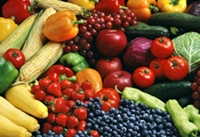LAWSUITS NEWS & LEGAL INFORMATION
Pesticides Linked with Near Doubling in ADHD Risk
Montreal, Quebec: Researchers are advising that parents feed their children organic produce as frequently as possible, following the results of a study just released which shows a link between attention deficit hyperactivity disorder (ADHD) in children and exposure to widely used pesticides such as malathion.
The study, a joint research effort between US and Canadian investigators, found that children who had higher concentrations of the most common dialkyl phosphate metabolites, a measure of organophosphate exposure, were nearly twice as likely to be diagnosed with ADHD compared with children who had no traces of the toxins, MSNBC.com reported.
"I think it's fairly significant. A doubling is a strong effect," Maryse F. Bouchard, a researcher at the University of Montreal in Quebec and lead author of the study published Monday in the journal Pediatrics told MSNBC.com. She says the take-home message for parents is buy organic whenever possible. "I would also recommend washing fruits and vegetables as much as possible," she said.
This is the largest study done to date on the effects of pesticide exposure on child development and behaviour. The study focused on measuring the levels of six pesticide metabolites in 1,139 children ranging in age from eight to 15 years, including 119 children diagnosed with ADHD. They were selected from the National Health and Nutrition Examination Survey between 2000 and 2004.
The results shows that children with a 10-times increase in certain metabolites that remain in the body following exposure to malathion had a 55 percent increased risk of ADHD. Furthermore, children with high levels of dimethyl thiophosphate, the most common of the six metabolites detected, were 93 percent more likely to have ADHD than children with undetectable levels of the marker.
Organophosphate pesticides work by interfering with insect's nervous systems, however they also effect humans. This class of pesticide reportedly accounts for up to 70 percent of the pesticides used in the US.
Published on May-17-10
The study, a joint research effort between US and Canadian investigators, found that children who had higher concentrations of the most common dialkyl phosphate metabolites, a measure of organophosphate exposure, were nearly twice as likely to be diagnosed with ADHD compared with children who had no traces of the toxins, MSNBC.com reported.
"I think it's fairly significant. A doubling is a strong effect," Maryse F. Bouchard, a researcher at the University of Montreal in Quebec and lead author of the study published Monday in the journal Pediatrics told MSNBC.com. She says the take-home message for parents is buy organic whenever possible. "I would also recommend washing fruits and vegetables as much as possible," she said.
This is the largest study done to date on the effects of pesticide exposure on child development and behaviour. The study focused on measuring the levels of six pesticide metabolites in 1,139 children ranging in age from eight to 15 years, including 119 children diagnosed with ADHD. They were selected from the National Health and Nutrition Examination Survey between 2000 and 2004.
The results shows that children with a 10-times increase in certain metabolites that remain in the body following exposure to malathion had a 55 percent increased risk of ADHD. Furthermore, children with high levels of dimethyl thiophosphate, the most common of the six metabolites detected, were 93 percent more likely to have ADHD than children with undetectable levels of the marker.
Organophosphate pesticides work by interfering with insect's nervous systems, however they also effect humans. This class of pesticide reportedly accounts for up to 70 percent of the pesticides used in the US.
Legal Help
If your child has or is suffering from an adverse health condition as a result of consuming toxins, as in the above story, please click the link below and your complaint will be sent to a lawyer who may evaluate your claim at no cost or obligation.Published on May-17-10
LEGAL ARTICLES AND INTERVIEWS
$23 Million for Poisoning Children Suit

Pesticides in Fruits and Vegetables Linked to ADHD in Children


January 11, 2011
A 16-year-long battle between the owners of an apartment building and the former tenants who claimed their children had been poisoned by the careless use of a pesticide finally ended with a $23 million verdict awarded to the Eibling family. Finally, there's a resolution at hand for both the Eiblings and their attorney, who pounded against what must have seemed like at times a brick wall. READ MORE
Pesticides in Fruits and Vegetables Linked to ADHD in Children

May 19, 2010
One would think it would be good to feed your kids lots of fruits and vegetables—a natural food source, high in fiber and nutrients. However, a recent study found that trace amounts of pesticides on commercially grown fruits and vegetables may associated with Attention Deficit Hyperactivity Disorder (ADHD). READ MORE

READER COMMENTS
MELISSA J MONFREDA
on